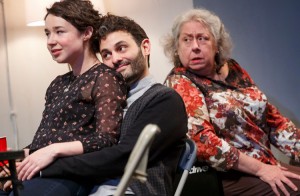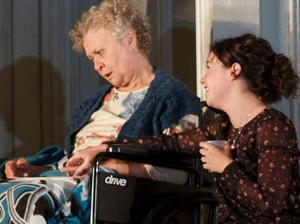Holiday gatherings have provided the setting for many American dramas, from William Inge’s classic Picnic (Labor Day) to Anna Ziegler’s A Delicate Ship earlier this season, set on Christmas Eve. Ironically, Christmas was also the holiday observed by the Jewish families in Alfred Uhry’s The Last Night of Ballyhoo and Richard Greenberg’s The Assembled Parties. Now, in Stephen Karam’s richly textured new play, The Humans, Thanksgiving gets its due. First, though, this reviewer must declare that Stephen is no relation, although our paths have crossed and he is a charming fellow. [It will also be less awkward for me if I refer to him by his first name from here on.]
The Humans is set in a basement apartment in Chinatown, marvelously realized by David Zinn with sterile white walls and a spiral staircase that joins two floors, both visible. The upper seems to be below the street level, while the lower is a windowless sub-basement. Brigid (Sarah Steele), the female half of the couple occupying it, boasts to her skeptical parents of its uniqueness. When her mother, Deirdre (Jayne Houdyshell), observes that outside the barred upstairs window is “an alley full of cigarette butts,” Brigid defends it as “an interior courtyard.”
It’s not just the details of real estate in New York that Stephen gets right. The Blake clan that has assembled includes father Erik (Reed Birney) and his mother, “Momo” (Lauren Klein), who is in the advanced stages of dementia. From her bottle of Ensure to her unintelligible mutterings to her blossoming at the sound of singing, Stephen has captured the reality of someone in the throes of age and dementia, and the strain on a loving family.
Brigid and her boyfriend, Rich (Arian Moayed), have moved in together to the mild disdain of Deirdre—and it’s one of the charms of Stephen’s play that most of the disapproval of others’ actions voiced by the characters is muted in a way that indicates a fundamental respect for one another.
There are, however, hints of deep troubles in the family, from finances to health. Erik is cutting his own hair, and some comments lead one to believe that he a miserly streak. Brigid’s lesbian sister Aimee (Cassie Beck) has recently broken up with her girlfriend and has been facing serious health problems. She has also been laid off. There are other financial troubles that surface during the day, and only Moayed’s level-headed, easygoing Rich seems unperturbed—but then, he’s due to inherit a trust fund.
The disagreements and problems that arise are deceptively quotidian. The devout Deirdre brings a statue of the Virgin Mary as a gift—“she’s appearing everywhere now, not just in Fatima.” And she hints gently but repeatedly that Brigid and Rich should get married. Deirdre is also aghast at the condition of the apartment: loud thumping that comes from the apartment above and lights (handled by Justin Townsend) that seem to have a mind of their own, flickering on and off, so that an emergency LED light in Deirdre’s care package has to be sought out. Occasionally, too, a trash compactor rumbles nearby in the building’s depths (sound is by Fitz Patton).
Director Joe Mantello utilizes the two levels of the stage well, often with action happening simultaneously (though at one point, when all the characters are gathered on the lower level, a loud thud from the apartment above probably would not be heard).
The excellent performances are all detailed nicely. Mention is made of mom’s knee problems, and Houdyshell gingerly steps down the stairs, planting both feet on one step before lifting a foot to step down on another. Reed Birney invests Erik, who is carrying a burdensome secret, with weariness and anxiety. Cassie Beck’s Aimee is emotionally adrift and yet phlegmatic about her mother’s e-mails communicating gossip about friends getting ovarian cancer and lesbians killing themselves. And Steele’s Brigid is just enough of a pill to earn her a few demerits, but not enough to cause antipathy.
As good as the portrayal of the family is, Stephen has a last-minute twist that sets his bland title in stark relief and yet has been cleverly, carefully prepared. The Roundabout has commissioned all his plays, and although The Humans is only his third, its stagecraft makes one eager to see what’s next.
Stephen Karam’s The Humans is playing at the Laura Pels Theater (11 West 46th St. between 6th and 7th Avenue) in Manhattan through Jan. 3. Evening performances are at 7:30 p.m. on Tuesday-Saturday; matinees are at 2 p.m. on Wednesday, Saturday and Sunday. The production has been announced for a Broadway transfer early in 2016. For tickets, call 212-719-1300 or visit RoundaboutTheatre.org.








